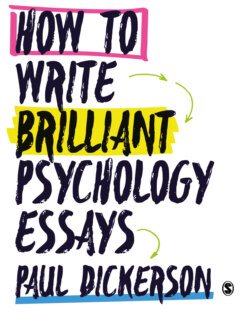Читать книгу How to Write Brilliant Psychology Essays - Paul Dickerson - Страница 125
На сайте Литреса книга снята с продажи.
Alternative sentence pool <and why they are not so great>
ОглавлениеWho am I? Who are you? What is self? Philosophers and psychologists have struggled with these issues through the ages. <Admittedly this is more than one sentence, but it reveals important weaknesses. Above all, it is far too vague. Being more specific is both better in itself and also enables relevant knowledge to be drawn in more easily. As it stands, can you even tell that the author of this knows anything about the topic at all?>
The self is a key issue in psychology and has been the focus of much empirical study. <Again, too vague and no real psychological knowledge is evident. Anyone could write a sentence like this without knowing anything about psychology.>
Gaertner, Sedikes and Graetz (1999) proved that self-schemas are ‘‘monuments of stability’’ (1999: 5), whereas Onorato and Turner (2004) proved that this was not true. <Psychology essays are typically much more concerned with evaluating different perspectives than with identifying what has been proved. This example is deliberately bad to vividly show how limiting it is to refer to ‘proof’. How could two completely contradictory views both be ‘proved’? Views are asserted, argued and suggested, and these are challenged, questioned and contradicted.>
Everyone has different views. Gaertner, Sedikes and Graetz (1999), Onorato and Turner (2004) and many others all disagree with each other. <This recognises that there are different perspectives but gives no sense of direction. It’s like asking for directions and being told some of the places on the way in no particular order. You are left wondering how they relate – what leads to what. This sentence also leaves you wondering who the ‘many others’ are and whether or not you’ll ever get to find out.>
This essay will examine the claim by Gaertner, Sedikes and Graetz that self-schemas are ‘monuments of stability’ and Onorato and Turner’s critique of it. <This sentence could have been written by anyone who can even partly comprehend the essay question. There is no knowledge here that isn’t entirely contained in the essay title itself. This is like a bogus psychic practitioner repackaging information that a sitter has already revealed to them as if it was evidence of their own psychic powers. A stronger alternative would display an understanding of Gaertner et al.’s position and the critique developed by Onorato and Turner – as well as other relevant perspectives – without being limited to the words of the title itself.>
Reflecting on the chapter: The end of the beginning
Introductions can be tough. But they are most tough when we start our essays right there, before we really know what we are trying to introduce. Imagine you were asked to give directions to a place you only vaguely knew and had perhaps been to once when you were half asleep. How much easier, if you had another chance, would it be to give those directions after you had been there with your eyes wide open. That’s the great thing about writing essays. Although they are highly directional in terms of how they are supposed to be read, we can write them in any order we choose. Let’s stay with that thought a moment longer. We can write our essays from the middle, end or beginning, or any mixture of the above. It may well make sense, therefore, to switch off some misquoted voice that tells us to ‘start at the beginning’. Why should we? It probably makes sense, at the very least, to edit our introduction in the light of where we get to in our essay itself. That way we at least have a clearer sense of the destination and the route we took.
